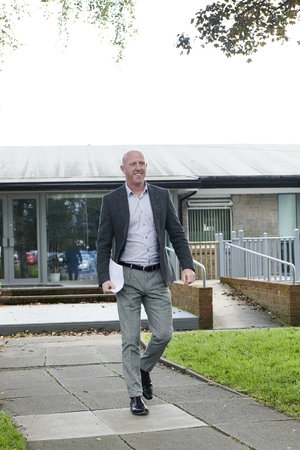 Tell us a bit about your background...
Tell us a bit about your background...
I am from the University of Strathclyde's hometown of Glasgow and have lived here all my life. I am very proud of my Scottish heritage. I love Glasgow, it's such a vibrant city, a national hub of culture, and a great place to live. I worked in the service industry for a few years after leaving high school but decided I wanted to do something meaningful and helpful to others. This led to me completing a BA in Social Work at the University of Strathclyde in 1998. I have worked for a large part of my career in children's services in Scotland. I have also held research posts in the Social Policy Departments at the University of Stirling and the University of Strathclyde. I completed a MSc in Child Care and Protection at the University of Dundee in 2010 to increase my knowledge and skills in child protection. In addition to my substantive posts, I have also worked for the last ten years as an independent international child protection consultant. This has involved working with international non-governmental and intergovernmental organisations, and advising governments across East and Central Africa, South East Asia, and Eastern Europe.
Why did you decide to study Advanced Residential Child Care at university?
In 2013, I took over the management of a private residential child care service. The qualifications I had did not meet the national requirements for professional registration as the manager of the service. I knew that completing the MSc in Advanced Residential Child Care would qualify me for registration. Also, the qualification had such a good reputation in the residential child care sector because of the curriculum content and the quality of teaching on the programme.
What has been the highlight of your course?
Having the opportunity to explore and debate in depth contentious issues about residential child care with such an eclectic class group who had a real passion for children's wellbeing.
What advice would you give to someone considering studying your course?
The course is designed for people who are already working in or around residential child care. That type of work can be demanding of your time due to shifts, etc. While the programme is designed to take this into account, being organised and committed is an important part of seeing the programme through successfully.
Tell us a bit about your current job role...
Currently I work for Kibble, one of Scotland's oldest charities based in Paisley. Kibble is a specialist child and youth care charity and social enterprise. We empower young people through care, education and support. For over 160 years, we have supported young people (aged 5-26) to manage past trauma, giving them consistent love and care, an inspiring education, and the therapeutic support to help them achieve their best. We provide a full range of integrated services that meet the needs of each individual.
I am a director within the Executive Team and Head of Community Services. In my role as a director, I have strategic management responsibilities which affect the whole organisation. Within my remit as Head of Community Services, I am responsible for the leadership and strategic management of a number of our residential homes based in communities, our intensive foster care service, and our early years residential services. The services are diverse and care for children and young people across a wide range of ages in a variety of settings.
What is the best part of your job?
One of the best things about working in Kibble is being part of an organisation that is at the forefront of developments in supporting children at risk in Scotland. Our range of services are dynamic and always growing and evolving. This means there is so much diversity in the tasks which I am involved in. Put simply, I could never get bored at Kibble.
What has been the most memorable moment of your career so far?
There have been too many to recount. I think perhaps some of the work I have done in development or emergency contexts overseas has been the most memorable. In 2016, I worked with UNICEF in Ukraine drafting a plan of action that would provide durable solutions for children affected by the war in Eastern Ukraine. This involved working with the trilateral contact group responsible for the Minsk peace agreement. Knowing I have done something to support children who are subject to some of the most egregious violations of their rights is certainly the most memorable work I have done.
What are your ambitions for the future?
I love working at Kibble. We have an amazing team of people here doing hugely important work giving some of Scotland's most complex and disadvantaged children and young people a chance at life. I'm really lucky to be part of the executive team leading the organisation, and right now, I don't think I would want to be anywhere else. My only ambition is that we make the world a safer and better place for children to live in.
Any final points, or words of wisdom?
People often pursue education for the betterment of the self. In part, I suppose this has been a goal of mine. More importantly, the pursuit of my education has been so that I can gain the skills to improve the lives of others. To quote Forest Emerson Witcraft's essay, "Within My Power", "A hundred years from now, it will not matter what my bank account was, the sort of house I lived in, or the kind of car I drove. But the world may be different, because I made a difference in the life of a child."
